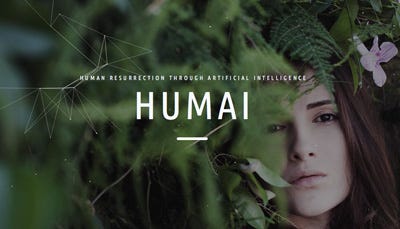December 1, 2015
A startup states that it can give humans the option of immortality within 30 years. While it has received international media attention, details of its plans remain scarce.
Qmed Staff
|
Humai states on its website that it is working towards "Human Resurrection through Artificial Intelligence." |
The startup Humai (Los Angeles) says it is working on using artificial intelligence and cryonics to give people the option of living eternally. While it is too early to tell if it is a hoax or a serious plan, the company's mission statement on its website sounds like a modern-day Frankenstein plan to resurrect the dead. "We are using artificial intelligence and nanotechnology to store data of conversational styles, behavioral patterns, thought processes and information about how your body functions from the inside-out," it states. "This data will be coded into multiple sensor technologies, which will be built into an artificial body with the brain of a deceased human. Using cloning technology, we will restore the brain as it matures."
TechInsider explains the firm's plans like this: "In the long-term, he wants to implant your brain into a robotic system. In the near-term, he wants to turn your personality into an app." Robotics-and by extension bionics--are quickly evolving technologies, and breakthroughs have been announced in recent years in linking the nervous system to prosthetic limbs, for instance. The notion of connecting a brain to an artificial body, however, still sounds like science fiction--at least according to 2015 standards.
In an interview with Popular Science, the company's CEO and founder Josh Bocanegra states that the company is developing apps to collect data from its clients while they are alive. After death, the company states it is planning on freezing its clients' brains before reimplanting them. To stave off aging, Bocanegra states that the firm will use nanotechnology and possibly cloning. The first app will be ready in 2017, according to the company.
The plans sound especially ambitious given Bocanegra's admission that the firm has a total of five employees. A high-school dropout, Bocanegra states that to date the firm has only been funded with his own cash but that the firm plans on seeking funding from other entities, however, which would enable it to expand.
On his LinkedIn profile, Bocanegra describes himself as a serial entrepreneur. The profile only mentions his work as a CEO and producer of a music production company, a writer, and the founder of LoveRoom, an Airbnb-meets-Tinder service that Forbes and others concluded was fake.
Bocanegra insists that Humai as well as his LoveRoom project are real. He claims to the Huffington Postt hat the former "is a legit project" and that the latter already has 16,000 members. The plan to help people may be "super ambitious," but that is exciting he says. "As an innovator, big ideas have always been my core motivation. Humai is obviously not monetary incentive - at least not anytime soon. This is a project I care deeply about and I only hope to contribute to making an impact on humanity."
While Bocanegra's current venture may seem outlandish, the notion of immortality as a serious possibility has received new attention in the past decades thanks to the writings of notable inventor and computer scientist Ray Kurzweil and other so-called Singulatarians, who believe that as technology advances, intelligence will become ever-more nonbiological while growing at an exponential rate. Kurzweil thinks that human life span itself could potentially be expanded to the point that humans essentially become immortal. "I think I have a good chance--I would put it at 80 percent--of getting to the point where it becomes indefinite, because you'll be adding more time than is going by to your remaining life expectancy," Kurzweil said in a recent interview with Slate.
Incidentally, Kurzweil is now director of engineering at Google; the company has a subsidiary known as Calico that is itself working to lengthen human life span.
Humai's approach is different than the immortality proposed by Kurzweil, which maintains the possibility that human personalities and cognition could ultimately be completely digitized. As TechInsider notes, "the Humai cofounder doesn't trust that you'd have the same sense of self after a mind transfer - if it's even possible to do so."
Learn more about medical technology trends at BIOMEDevice San Jose, December 2-3. |
Like what you're reading? Subscribe to our daily e-newsletter.
About the Author(s)
You May Also Like



